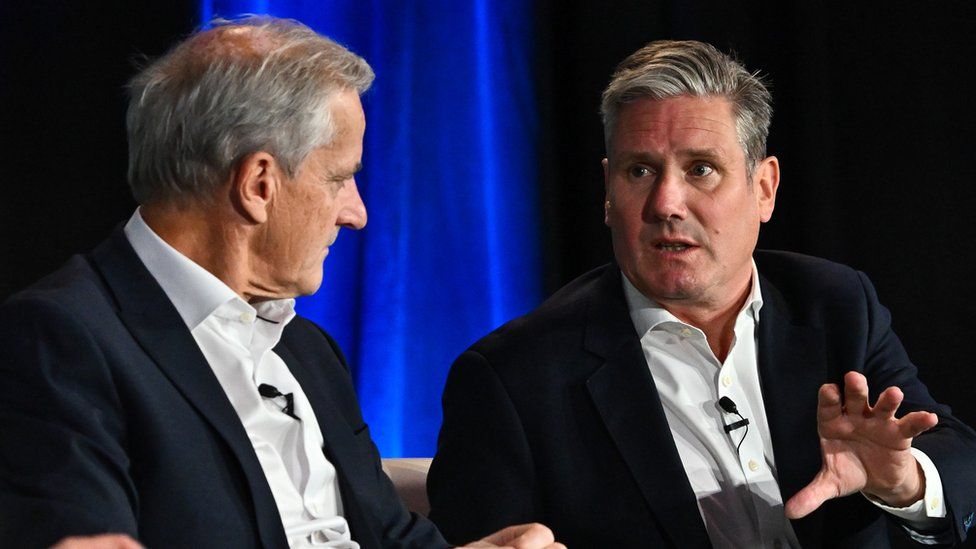
Keir Starmer made the remarks during a panel discussion alongside the Norwegian PM in Canada
Labour has tried to clarify its intended post-Brexit relationship with the EU, after comments from Sir Keir Starmer at a conference.
A video has emerged of the Labour leader saying the party doesn’t want to “diverge” from the bloc’s regulations.
Cabinet minister Michael Gove said the remarks showed Labour would “compromise” potential Brexit benefits.
But Labour suggested his remarks were limited to the areas of food, environmental and labour standards.
A spokesperson added it did not support the process, known as dynamic alignment, under which the UK would pledge to maintain similar laws to the EU in a number of areas.
Sir Keir’s remarks, made on Saturday during a conference of centre-left leaders in Canada, were first reported by Sky News but were also livestreamed at the time.
He told an audience at the summit: “Most of the conflict with the UK being outside of the (EU) arises insofar as the UK wants to diverge and do different things to the rest of our EU partners.
“Obviously the more we share values, the more we share a future together, the less the conflict, and actually, different ways of solving problems become available,” he said.
“Actually we don’t want to diverge, we don’t want to lower standards, we don’t want to rip up environmental standards, working standards for people at work, food standards and all the rest of it.
“Suddenly you’re in a space where notwithstanding the obvious fact that we are outside the EU and not in the EEA, there’s a lot more common ground than you might think.”
It was not immediately obvious from the remarks whether he was talking about divergence in the specific areas he mentioned, or in general.
‘Real Keir Starmer’
After the Sky report, a series of Conservative ministers seized on the remarks to suggest the Labour leader was changing his Brexit stance.
Housing Secretary Michael Gove said they revealed “the real Keir Starmer,” and reduce the UK’s “power” after Brexit to design better regulations in a number of areas.
Posting on X, formerly known as Twitter, Foreign Secretary James Cleverly said it showed Sir Keir “wants to rejoin the EU in all but name”.
A Labour spokesperson rejected the idea the party would take the UK back into the EU, adding that Sir Keir had also ruled out rejoining its single market or customs union.
They added: “The Tories have not used Brexit to diverge on food, environmental or labour standards and if they have a plan to do so then they should come clean with people.”
Starmer triggers Brexit critics
In the dictionary of Brexit, there are certain trigger words. “Diverge” is one of them.
That is because diverging from the European Union, its institutions but also its rules, is at the core of Brexit.
Those who advocated Brexit from the outset will always point to the fact that Keir Starmer not only campaigned for Remain, but also wanted a second referendum.
So his language will always be pored over by his critics, seeking to argue that his instincts to are to dilute the consequences of withdrawal, or fail to maximise the benefits, depending on your point of view.
This is the context in which Labour has made this clarification.
Without agreeing to “dynamic alignment”, the UK is set to move away from EU laws in a number of areas over time, as the bloc updates its own regulations.
But the government has also actively moved away from EU regulations in areas including farm subsidies and rules on providing taxpayer support to businesses, and has plans to do so in areas like data protection.
However, it has also ditched a plan for thousands of EU-era laws to expire automatically at the end of the year, instead announcing 600 regulations it wants to change or get rid of before the end of the year.
Sir Keir recently raised questions over the relationship a future Labour government could have with the EU, saying his party would seek a “much better” Brexit trade deal with the bloc.
He said the deal, originally negotiated by Boris Johnson and up for review in 2025, was “too thin” and said he would improve it, although he did not specify how.
Labour says it would negotiate a new agreement on the movement on animal products, and recently said it wanted a new deal with the EU to stop migrant crossings over the English Channel.








